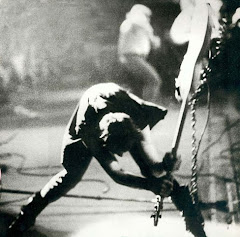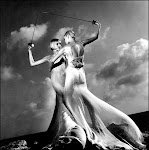
Did you have a Schwinn banana seat bicycle as a kid? The one with the chopper-esque handlebars to which you'd attach, if you were a girl at least, those glittery, multi-colored plastic streamers that would look so cool whenever you sped down a particularly steep hill or the wind was blowing especially hard?
I did. And for the few years of my little kid youth that we spent living in an actual city, I was permanently attached to the thing. Mainly because during the summer my mother forbid us to spend any time inside. We got up, washed, ate breakfast, and our butts were summarily tossed outside until noon, when we were expected to show back up on our front porch, peering through the screen door until our mothers appeared to hand us sandwiches and something cold to drink. The only way we were actually allowed back inside is if we had a medical emergency (bloody nose: not an emergency, hold your head up and wash at the hose outside; broken limb or cracked head: emergency) or it was dinnertime. After which, we were expected to roam around back outside until dark, when mothers' voices across the neighborhood would ring out, calling their children home like errant puppy dogs.
Can you imagine? Parents treating their children like this today? Can you imagine the adventures those children would have, the skills they'd pick up, the things they'd see and do? The freedom of life on the road, afforded by a $25 bike with a ridiculous seat and cramp-inducing handlebars? I loved it.
But what of our mothers? The thousands of suburban housewives who populated our block? What did they do, once their husbands went off to jobs or school and they had abandoned their cubs to the urban veldt, their days a slow unfurling of dishes and laundry and soap operas and grocery shopping and preparing for their husbands' return?
I got a glimpse into this rarefied world only once. It was a muggy summer day in the early 1970s, Eugene, Oregon, coming on mid afternoon, the streets still steaming from a morning rain shower, worms still wiggling in puddles, the smell of exhaust fumes and mold and green grass a pungent cocktail of scent hanging in the air. I was hot and thirsty and wanted a glass of lemonade, not a blast of metallic-tasting water from a hose. So I headed home on my trusty Schwinn to see if I could convince my mother to let me inside our kitchen, but as I walked up the front porch, music stopped me from opening the screen door.
Inside, my mother, clad in a Pucci-esque caftan, her hair piled loosely on top of her head, barefooted, dancing softly to Carol King's "I Feel the Earth Move," her gold hoop earrings bumping against her neck, eyes closed, arms swaying above her head.
For many years whenever I'd hear that song, I'd think of my mother, but it wasn't until I was much older that it occurred to me to wonder if she had actually been happy in her role as housewife extraordinaire. Was that the life she imagined for herself when, as a young girl barely out of her teens, she put an entire ocean between herself, her family, and everything she knew to strike out on her own in the USA? Did she find that freedom or did she find only drudgery?
Of course, my mother did more than cook, clean, and wipe our noses. She had book club meet ups with the neighbors, participated in the community garden, took cooking classes, threw parties, collected antiques, and went out on the town with my father every now and then. And later, much later, she would get a job and her GED, go to school for her bachelor's and then her master's and then teach. Proof that you could reinvent yourself at any time in your life. That you could say, "This is not enough. I want more."
And ever since, Carol King has always sounded just a little bit like freedom to me.















